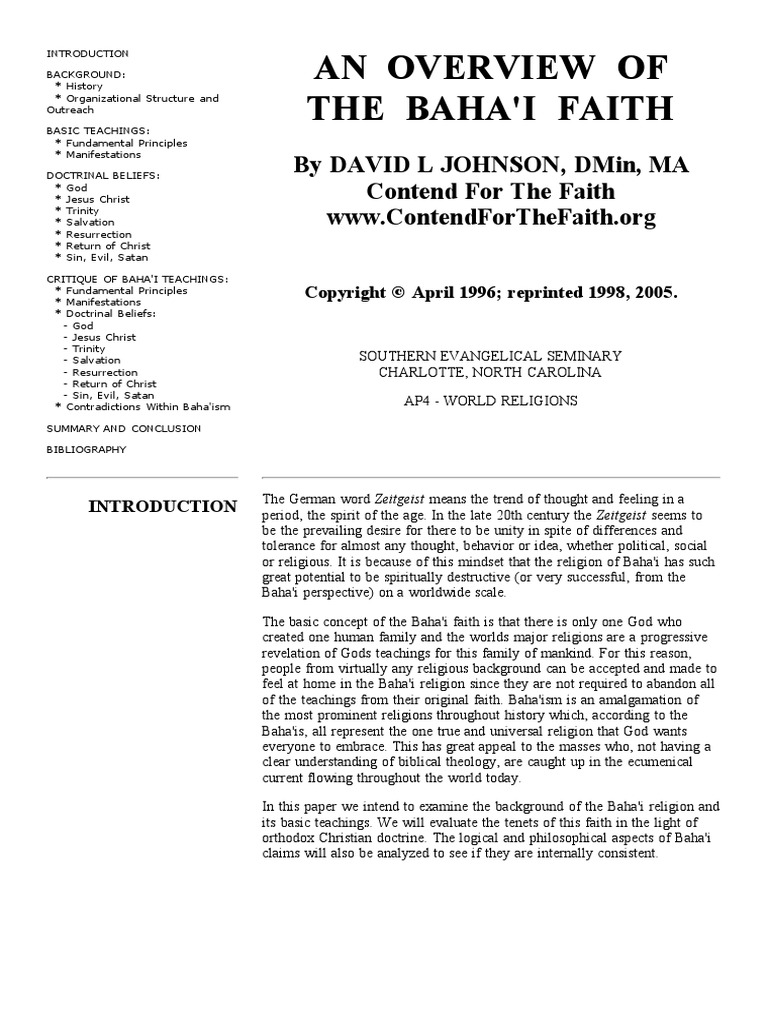The Baha’i Faith, a relatively nascent religion founded in the 19th century, is anchored in the principles of unity, justice, and peace. However, amid its profound teachings and inclusive philosophy, the Baha’i Faith delineates certain prohibitions that serve to uphold the integrity of its core tenets. Understanding these prohibitions not only offers insight into the moral framework of the Baha’i community but also illustrates the pursuit of a harmonious existence that the faith embodies. This article ventures into the various prohibitions espoused within the Baha’i teachings, categorized into key thematic sections.
1. Prohibition of War and Conflict
At the heart of Baha’i teachings lies an emphatic rejection of war and conflict. Baha’ullah, the founder of the Baha’i Faith, ardently advocates for the resolution of disputes through dialogue and concord rather than violence. War, as perceived by Baha’is, is an affront to the sanctity of human life and serves to exacerbate division among nations and peoples. The teachings implore believers to strive for peaceful coexistence, reflect on the ardent consequences of war, and engage in advocacy for disarmament. This prohibition is particularly poignant in a world riddled with discord, as Baha’is are called to promote constructive dialogue that leads to understanding and reconciliation.
2. Prohibition of Prejudice
In alignment with its ethos of unity, the Baha’i Faith categorically prohibits all forms of prejudice. This encompasses racial, religious, gender-based, and socio-economic discrimination. Baha’is are enjoined to cultivate an inclusive worldview, acknowledging the oneness of humanity. Prejudice, as understood in the Baha’i context, leads to fragmentation and discord, undermining the collective potential of society. Consequently, followers are encouraged to actively dismantle prejudicial attitudes and practices, facilitating an environment of acceptance and compassion.
3. Prohibition of Sectarianism
Another significant tenet of Baha’i teachings is the proscription of sectarianism. The Baha’i Faith regards sectarian divisions as detrimental to spiritual progress and societal cohesion. The belief that no single religious path holds absolute truth fosters an atmosphere where interfaith dialogue thrives, and mutual respect flourishes. Baha’is are urged to transcend sectarian boundaries, fostering cooperation among diverse religious communities. This prohibition promotes the understanding that all religions are, in essence, manifestations of the same divine truth, albeit interpreted through diverse cultural lenses.
4. Prohibition of Substance Abuse
The Baha’i Faith underscores the significance of maintaining physical and mental well-being, thereby instituting a prohibition against the abuse of intoxicants and substances. This includes both alcohol and drugs, which are viewed as impediments to spiritual growth and personal integrity. Followers are encouraged to cultivate self-discipline and moderation, recognizing that the consumption of such substances often leads to detrimental consequences for individuals and society at large. The teachings advocate for habits that foster clarity of thought and purpose, thereby promoting a holistic approach to health and spirituality.
5. Prohibition of Caste Systems
Baha’i teachings vehemently oppose the establishment and perpetuation of caste systems or social hierarchies based on birth or status. The principle of the oneness of humanity is intrinsically tied to the belief that all individuals possess inherent dignity and worth. Consequently, Baha’is are called to actively combat any structures that propagate inequality or prioritize individuals based on arbitrary distinctions. This prohibition resonates profoundly in contemporary discussions about social justice and equity, highlighting the Baha’i commitment to fostering environments where every person can thrive.
6. Prohibition of Sexual Immorality
In matters of personal conduct, the Baha’i Faith delineates clear guidelines regarding sexual morality. Sexual relationships are sanctified within the bounds of marriage, which is regarded as a sacred partnership. Baha’is are admonished against promiscuity, fornication, and adultery, which are perceived to undermine the stability of family life and societal structure. The teachings encourage believers to foster relationships based on love, respect, and mutual support, thereby cultivating an environment conducive to spiritual and emotional growth.
7. Prohibition of Materialism
The Baha’i Faith extols the virtues of spiritual versus material wealth, warning against the excesses of materialism. Followers are encouraged to engage with the world responsibly, prioritizing spiritual growth and community service over the acquisition of material possessions. This prohibition is a reminder of the transitory nature of worldly gains and the enduring value of virtues such as generosity, humility, and service to humanity.
8. Prohibition of Disobedience to Laws
Baha’is are taught to respect and obey the laws of the land, provided those laws do not contradict Baha’i principles. This principle instills a sense of civic responsibility and accountability, fostering a spirit of cooperation within communities. However, in instances where societal laws conflict with Baha’i teachings, believers are encouraged to seek peaceful avenues for reform without resorting to rebellion or insurrection.
Conclusion
In conclusion, the prohibitions delineated within Baha’i teachings serve as guiding principles that foster spiritual growth, social harmony, and the advancement of justice. Each prohibition encapsulates the Baha’i aspiration toward unity and collective well-being, urging followers to cultivate a life rich in moral integrity and communal responsibility. As the Baha’i community continues to engage with the complexities of contemporary society, these teachings offer a perennial compass guiding individuals toward a transformative and harmonious existence.
